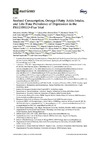Identificador persistente para citar o vincular este elemento:
https://accedacris.ulpgc.es/jspui/handle/10553/55017
| Título: | Seafood consumption, omega-3 fatty acids intake, and life-time prevalence of depression in the PREDIMED-plus trial | Autores/as: | Sánchez-Villegas, Almudena Álvarez-Pérez, Jacqueline Toledo, Estefanía Salas-Salvadó, Jordi Ortega-Azorín, Carolina Zomeño, Maria Dolores Vioque, Jesús Martínez, Jose Alfredo Romaguera, Dora Pérez-López, Jessica López-Miranda, José Estruch, Ramón Bueno-Cavanillas, Aurora Arós, Fernando Tur, Josep A. Tinahones, Francisco J. Lecea, Oscar Martín, Vicente Ortega-Calvo, M. Vázquez, Clotilde Pintó, Xavier Vidal, Josep Daimiel, Lidia Delgado-Rodríguez, Miguel Matía, Pilar Corella, Dolores Díaz-López, Andrés Babio, Nancy Muñoz, Miguel Ángel Fitó, Montserrat de la Hera, Manoli García Abete, Itziar García-Rios, Antonio Ros, Emilio Ruíz-Canela, Miguel Martínez-González, Miguel Ángel Izquierdo, Marisol Serra-Majem, Lluis |
Clasificación UNESCO: | 3206 Ciencias de la nutrición | Palabras clave: | Physical-Activity Questionnaire Polyunsaturated Fatty-Acids Fish Consumption N-3 Metaanalysis, et al. |
Fecha de publicación: | 2018 | Proyectos: | Efecto de la Dieta Mediterránea Hopocalórica y Promoción de la Actividad Física en Prevención Primaria Cardiovascular.Estudio Piloto Sobre Marcadores Intermedios. | Publicación seriada: | Nutrients | Resumen: | Background: The aim of this analysis was to ascertain the type of relationship between fish and seafood consumption, omega-3 polyunsaturated fatty acids (-3 PUFA) intake, and depression prevalence. Methods: Cross-sectional analyses of the PREDIMED-Plus trial. Fish and seafood consumption and -3 PUFA intake were assessed through a validated food-frequency questionnaire. Self-reported life-time medical diagnosis of depression or use of antidepressants was considered as outcome. Depressive symptoms were collected by the Beck Depression Inventory-II. Logistic regression models were used to estimate the association between seafood products and -3 PUFA consumption and depression. Multiple linear regression models were fitted to assess the association between fish and long-chain (LC) -3 PUFA intake and depressive symptoms. Results: Out of 6587 participants, there were 1367 cases of depression. Total seafood consumption was not associated with depression. The odds ratios (ORs) (95% confidence intervals (CIs)) for the 2nd, 3rd, and 4th quintiles of consumption of fatty fish were 0.77 (0.63-0.94), 0.71 (0.58-0.87), and 0.78 (0.64-0.96), respectively, and p for trend = 0.759. Moderate intake of total LC -3 PUFA (approximately 0.5-1 g/day) was significantly associated with a lower prevalence of depression. Conclusion: In our study, moderate fish and LC -3 PUFA intake, but not high intake, was associated with lower odds of depression suggesting a U-shaped relationship. | URI: | https://accedacris.ulpgc.es/handle/10553/55017 | ISSN: | 2072-6643 | DOI: | 10.3390/nu10122000 | Fuente: | Nutrients [ISSN 2072-6643], v. 10 (12), (Diciembre 2018) |
| Colección: | Artículos |
Citas SCOPUSTM
53
actualizado el 08-jun-2025
Citas de WEB OF SCIENCETM
Citations
48
actualizado el 22-feb-2026
Visitas
109
actualizado el 11-ene-2026
Descargas
78
actualizado el 11-ene-2026
Google ScholarTM
Verifica
Altmetric
Comparte
Exporta metadatos
Los elementos en ULPGC accedaCRIS están protegidos por derechos de autor con todos los derechos reservados, a menos que se indique lo contrario.
